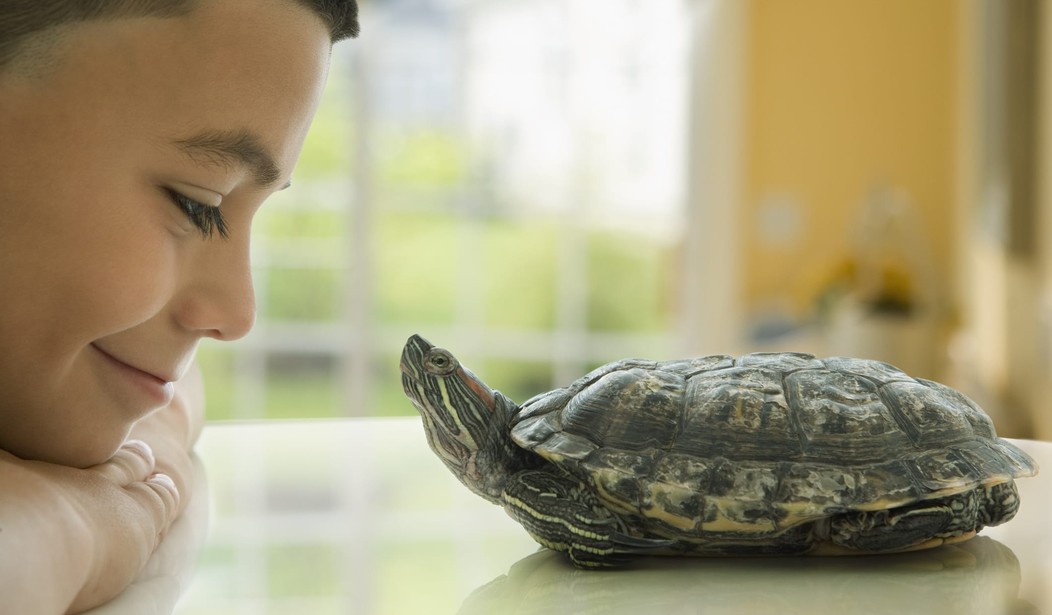I know that the tiny turtles living in those little clear tubs that are garnished with a goofy plastic palm tree being sold at the kiosk in the mall are adorable. Your kids are promising that they’ll take excellent care of the cute little reptile so you’ll buy it for them, but you know what’s not so cute? Taking your children to the hospital because they are in agony due to a nasty salmonella infection that they’ve caught from handling their new pet.
The Centers for Disease Control and Prevention (CDC) posted a warning that details a virulent outbreak of salmonella that is directly linked to handling pet turtles across 13 states: California, Connecticut, Illinois, Louisiana, Maryland, Massachusetts, Mississippi, New Jersey, New York, Ohio, Pennsylvania, Texas, and Washington.
So far, New York is the hardest hit state, with 11 recorded cases where patients have tested positive for a specific strain of bacteria called Salmonella Agbeni. Thankfully, there haven’t been any deaths caused by the outbreak, but there have been at least 33 infections nationwide, and of those, 12 were children ages 5 and younger.
The symptoms commonly associated with a salmonella bacteria include diarrhea, abdominal cramps, nausea, vomiting, high fever, and chills, and these conditions often fade away after 4 to 7 days. Although most adults are able to suffer through a salmonella infection without going to the hospital, this disease is life threatening to small children and the elderly because their weaker immune systems may not be able to keep the infection from worsening. Turtle-borne salmonella is also a threat to pregnant women, anyone with diabetes, liver problems, and other conditions that impair the immune system.
FDA officials have warned Americans not to buy small turtles or to give them as gifts since 1975 and they have banned the sale of turtles that are under four inches long. Smaller turtles are often linked to salmonella outbreaks, mostly because kids like to pick up and play with the cute hatchlings. The exact laws regarding the sale of turtles vary across state lines, but even if there weren’t any regulations on pet turtles, far too many parents simply don’t know just how unclean turtles and other reptiles can be.
Infected turtles shed salmonella in their fecal matter, which is deposited in the water that the reptiles swim in, and the nasty bacteria ends up thriving on the animal’s skin and shell. It doesn’t matter how darling, clean, and healthy a tiny turtle may look, because turtles are immune to the salmonella bacteria. If you don’t thoroughly sanitize your hands after handling one, you’ll likely find out of the reptile was a carrier before too long. I should also note that amphibians, including frogs, newts, and toads, can just as easily harbor salmonella on their skin as any reptile could.
Apparently, the word needs to get out that pet owners shouldn’t try to cuddle with lizards and tortoises as if they were puppies or kittens because around 74,000 people catch salmonella from a reptile each year in the United States. Some other notable pet-related salmonella outbreaks in the U.S. include:
2015 – 22 cases of salmonella were transmitted from crested geckos over 17 states, and 3 people were hospitalized.
2014 – 166 cases of salmonella were transmitted from bearded dragons over 36 states, and 61 people were hospitalized.
2011 – 241 cases of salmonella were transmitted from African clawed frogs over 42 states, and 72 people were hospitalized.
2013 – 473 cases of salmonella were transmitted from small turtles over 43 states, and 78 people were hospitalized.
The fact that small turtles are often coated with salmonella is only half of the problem; children who think turtles are irresistible are the other. Snuggling, kissing, and petting a beloved pet turtle is a natural reaction for a good-hearted child who loves taking care of his shelled friend. But parents need to go above and beyond to make sure that kids understand that they need to painstakingly wash their hands with soap and water after interacting with their pet reptile.
That also goes for cleaning a turtle’s aquarium or coming into direct contact with turtle waste. Never allow a turtle to roam free in your home. A free-range turtle spreads salmonella wherever it crawls, and it can be especially hazardous if the bacteria establishes itself in your bathroom or kitchen. The CDC even goes as far as to warn that people taking care of turtles should disinfect their bathtub with bleach if it is used to clean a turtle, its food bowl, or aquarium, and to never use a kitchen sink for turtle-cleaning purposes to ensure that your kitchen stays salmonella-free.
Even if you are a responsible turtle owner with a child in the house who is too young to properly handle the reptile, parents have to be incredibly careful to disinfect not only their hands after touching the turtle or its enclosure, but any surface that their pet came into contact with as well to prevent the spread of salmonella.
A pet turtle is a real commitment that requires a specialized enclosure with the proper space, filtration system, and lighting. These animals have extremely long life spans and can easily grow over a foot long, making them a major responsibility to take care of, and not something you’d buy on a whim from some guy at the flea market. I’m not telling anyone not to own a turtle, but if you do, I’m asking you to do it the right way by taking excellent care of your reptilian pal, and ensuring that the life-threatening salmonella living on its shell doesn’t threaten anyone outside of its aquarium.









Join the conversation as a VIP Member